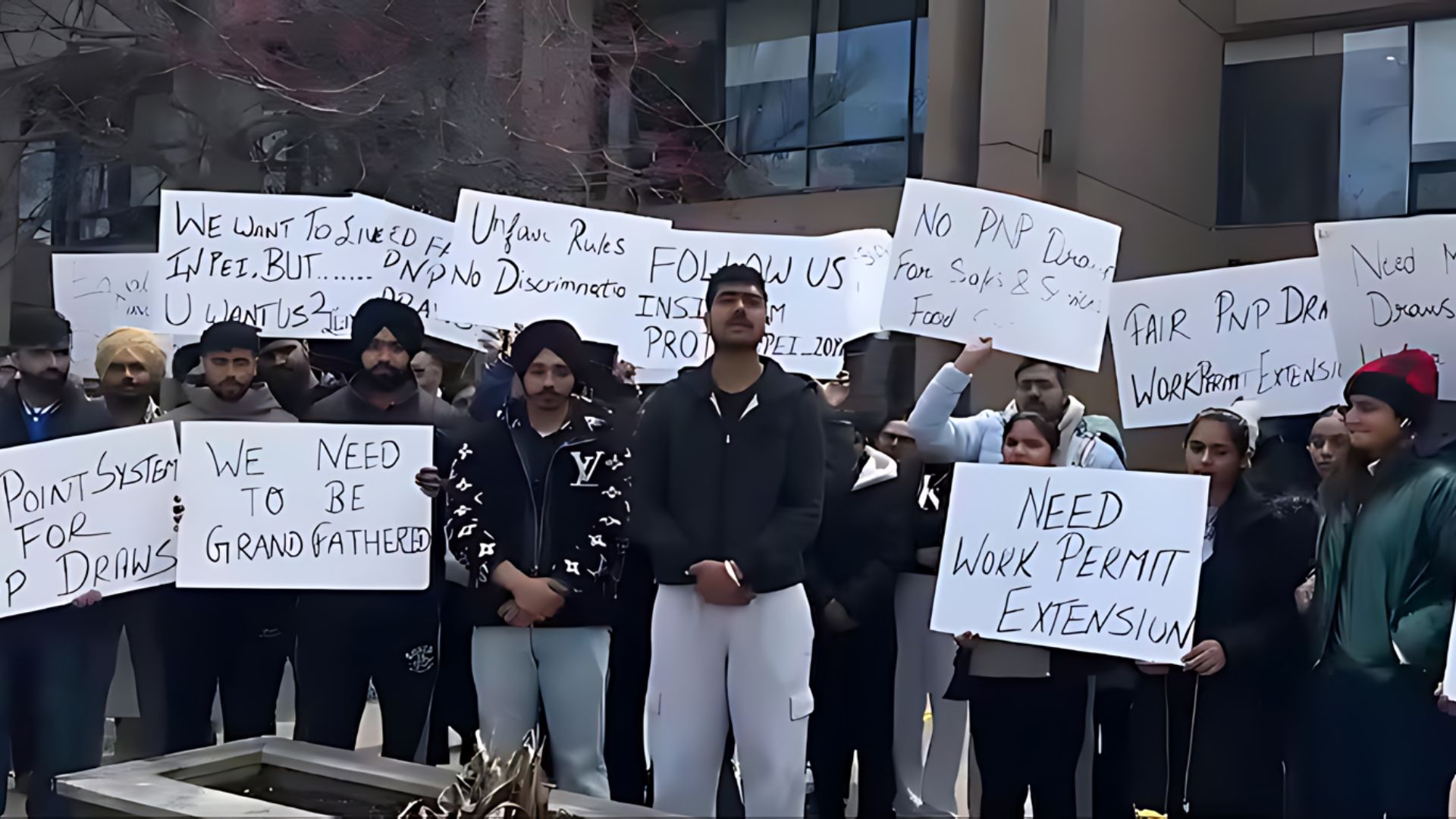Hundreds of Indian students in Canada are protesting against the Canadian government for changing immigration policies overnight and denying them work permits. This unexpected policy shift has left many students, who came to Canada with the hope of better opportunities, facing the threat of deportation.
“They invited us here, and now they want us to leave,” protest leader Rupender Singh told CBC. “We have three main demands,” said Rupinder Pal Singh, another protest leader who arrived in Canada from India in 2023. “They provided us with incorrect information. This is outright exploitation,” he added.
“We only get a once-in-a-lifetime chance. We came to PEI because the rules allowed us to apply for PR after six months or a year. Yes, we will be affected, but so will the people of PEI, who might now have to wait 20 minutes for a cup of coffee,” remarked protest leader Rupender Singh, according to CBC.
The Situation in Prince Edward Island (PEI)
In Prince Edward Island (PEI), hundreds of Indian students are staging protests and demanding that authorities allow them to remain in the country. They allege that despite graduating, they are being denied work permits and now face deportation. The students have threatened to go on a hunger strike if their demands are not met.
Students who have been in the country for over a year claim that the government changed the policy overnight. “They called us here; now they want us to leave,” protest leader Rupender Singh told CBC. “We have three demands that we are focusing on,” said Rupinder Pal Singh, another leader of the protest, who came to Canada from India in 2023. “Our province gave us false hopes,” asserted Singh, who came to Canada from India in 2019. “They were giving us the wrong information. This is totally an exploitation,” he added. One of the protesters also highlighted the impact on both immigrants and locals, suggesting that without international graduates, locals might face delays in services like coffee at Tim Hortons.
Videos surfacing on the internet show large groups of Indian students marching through the streets of Charlottetown, chanting for fairness and protesting against sudden policy changes.
As we discussed today, we have announced a day off from work on Monday which is 13th May 2024. Its humble request for all the workers specially working in RETAIL, SALES & SERVICES. FOOD SECTOR. SKILLED LABOUR, TRUCK DRIVERS & LOCAL STORE EMPLOYERS. (1/2)#PROTESTPEI2024 @InfoPEI pic.twitter.com/yF77g2NzSo
— Protest PEI 2024 (@Protest_pei) May 11, 2024
The Impact of PEI’s New Law
In July 2023, the Prince Edward Island (PEI) region passed a law restricting postgraduate work permits to students with specific qualifications. Now, only students with construction/home-building and healthcare qualifications are eligible for permits, leaving many international students unable to continue working in Canada. This indirectly means hundreds of immigrants in other industries, such as retail sales and service, may not have their work permits extended when they expire in the next few months, reported CBC News.
WHY are international students FROM INDIA, who are not even permanent residents in this country, allowed to present to PEI cabinet ministers in CANADIAN GOVERNMENT in an attempt to sway rules that have already been made?
THEY HAVE TO GO BACK#YeetTheJeets pic.twitter.com/EnGe2JGQSs
— LΞIGH (@LeighStewy) May 15, 2024
In February, the PEI government announced that it would reduce the number of people it nominates for permanent residency in Canada through the Provincial Nominee Program (PNP) by 25 percent in 2024. This reduction is partly due to pressure on PEI’s healthcare system and housing market, CBC News reported.
Similar restrictions were imposed in Manitoba earlier this year, but after protests, the Trudeau government extended postgraduate work permits by two years. Now, students in PEI are demanding similar treatment.
The Students’ Demands
The protesting students are demanding an extension of work permits and a review of the recent changes to immigration policies. They seek to be ‘grandfathered’ in, which would allow them to be exempted from new regulations or policies based on their previous status or circumstances. If a new immigration policy imposes stricter requirements, individuals who applied before the policy change should be allowed to proceed under the previous, less stringent criteria.
We are going for total blackout. “We just don’t want to be listened”
WE WANT TO BE TAKEN SERIOUSLY.#PROTESTPEI2024 #WEFIGHTBACK@MarcMillerVM @InfoPEI @CBCNews @JustinTrudeau @CitImmCanada @PEIPCParty @GordMcNeillyPEI pic.twitter.com/jPcc80MOua— Protest PEI 2024 (@Protest_pei) May 11, 2024
The protest by immigrant students began on May 9 with about 25 people and has since grown to over 300. This status acknowledges the rights of individuals who initiated their immigration process under different conditions and ensures they are not unfairly affected by subsequent changes in the law. Grandfathered status provides a measure of stability and fairness in immigration systems, allowing individuals to plan their lives and futures with greater certainty.
Support the deportation of the PEI Indian “international students”
Like and repost to stand in solidarity ✊🏻✊🏻 pic.twitter.com/BAOBdUymUL
— Canadian Patriot (@PPC4Liberty) May 14, 2024
The students have set a deadline for action, threatening a hunger strike if their demands are not met by mid-May. As tensions rise, the protests are growing, with hundreds joining in and garnering support from various communities. Employers and minority groups have backed the cause, highlighting the broader impact of these policy changes on the community as a whole.

40% of Indian Students Boost Canadian Economy
The economy of Canada is a highly developed mixed economy, with the world’s tenth-largest economy as of 2023 and a nominal GDP of approximately US$2.117 trillion. In 2022, Indian students made the most significant contribution to the Canadian economy among international students, amounting to approximately 40% or $10.2 billion out of a total of $22.3 billion. Canada’s economy is expected to suffer in the coming years due to a drop in the number of Indian students applying to Canadian universities and colleges, former Ambassador Anil Trigunayat told Sputnik India. His comments followed several media reports indicating a decline in the number of Indian students applying to Canada.
The Canadian government estimates that in 2023, around 900,000 international students applied to study in Canada, a number that has tripled from a decade ago. About 40% of these students, approximately 360,000, are from India, representing the largest group. Additionally, Indian students sustain over 170,000 jobs in Canada, constituting a substantial part of the total 370,000 jobs supported by international students. Moreover, there were over one million registered Indians in Canada as of December 2020. The region with the largest Indian population was Ontario, with 222,000, followed by Manitoba, which counted 164,000 Indians. The regions with the smallest Indian populations were Yukon and Northwest Territories.
The protests by Indian students in Canada highlight the significant challenges faced by international students due to abrupt policy changes. The situation in PEI serves as a microcosm of broader issues affecting international students across Canada. As these students continue to fight for their rights, the outcome of these protests could have far-reaching implications not only for the students themselves but also for the Canadian economy and its international reputation. The resolution of this issue will be a critical test of Canada’s commitment to fairness and support for its international student community.

















